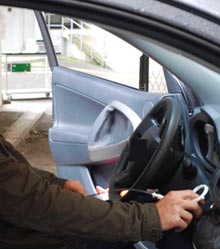 In this day and age anything with a rudimentary electronic circuit is subject to hacking. So it should come as no big surprise that hackers are paying attention to the keyless entry systems found in many of modern automobiles. The good news for car owners is that, so far, the hackers in question have been benevolent Swiss researchers. The bad news: the researchers think that car thieves may be able to hack into cars and drive away with some basic gadgetry.
In this day and age anything with a rudimentary electronic circuit is subject to hacking. So it should come as no big surprise that hackers are paying attention to the keyless entry systems found in many of modern automobiles. The good news for car owners is that, so far, the hackers in question have been benevolent Swiss researchers. The bad news: the researchers think that car thieves may be able to hack into cars and drive away with some basic gadgetry.
The study was conducted by ETH Zurich, a system security firm based in Switzerland, and first reported by MIT’s Technology Review. The group tested 10 car models from eight different manufacturers. All were equipped with keyless entry and keyless ignition systems controlled through wireless fobs. All 10 cars were able to be accessed and driven away.
The researchers rigged a dual-antennae system to gain access to cars: one antennae was placed close to the vehicles and the other close to the key. Signals from the car to the key were then intercepted and relayed back, tricking the car into unlocking itself. The system worked no matter the type of encryption or protocol used to communicate between the car and its key.
In addition to being a rather simple hack, it’s also surprisingly cheap. Researchers were able to access the cars by means of a cable that ran between the key’s vicinity and the car’s. That method used materials that cost about $50 in total. Another wireless version of the attack could cost between $100 and $1,000, depending on the type of electronics used.
The group envisioned scenarios where teams of thieves monitored parking lots, waiting for target vehicles to be parked. One person would trail the car’s owner with an antennae to relay a signal back to the car. The trailer needn’t be too close to the victim to pick up the key’s signal — within eight meters or so should work. Once the signal is picked up and transmitted, the car can be unlocked by proximity and started relatively quickly. A “clean getaway” perhaps has never been easier in the world of car theft.
The researchers haven’t yet divulged which cars were tested. Nor have they reported that some models were easier targets than others. But judging that eight makes failed the test, it’s safe to say all keyless entry systems are at risk. The study suggests owners cover their keys to prevent the signal from being transmitted its maximum distance. The groups also suggests that manufacturers consider installing an on/off switch on keys that would allow owners to stop signal transmissions.
Expect to hear more details when the group formally announces its findings at the Network and Distributed System Security Symposium, to be held in February in San Diego.


